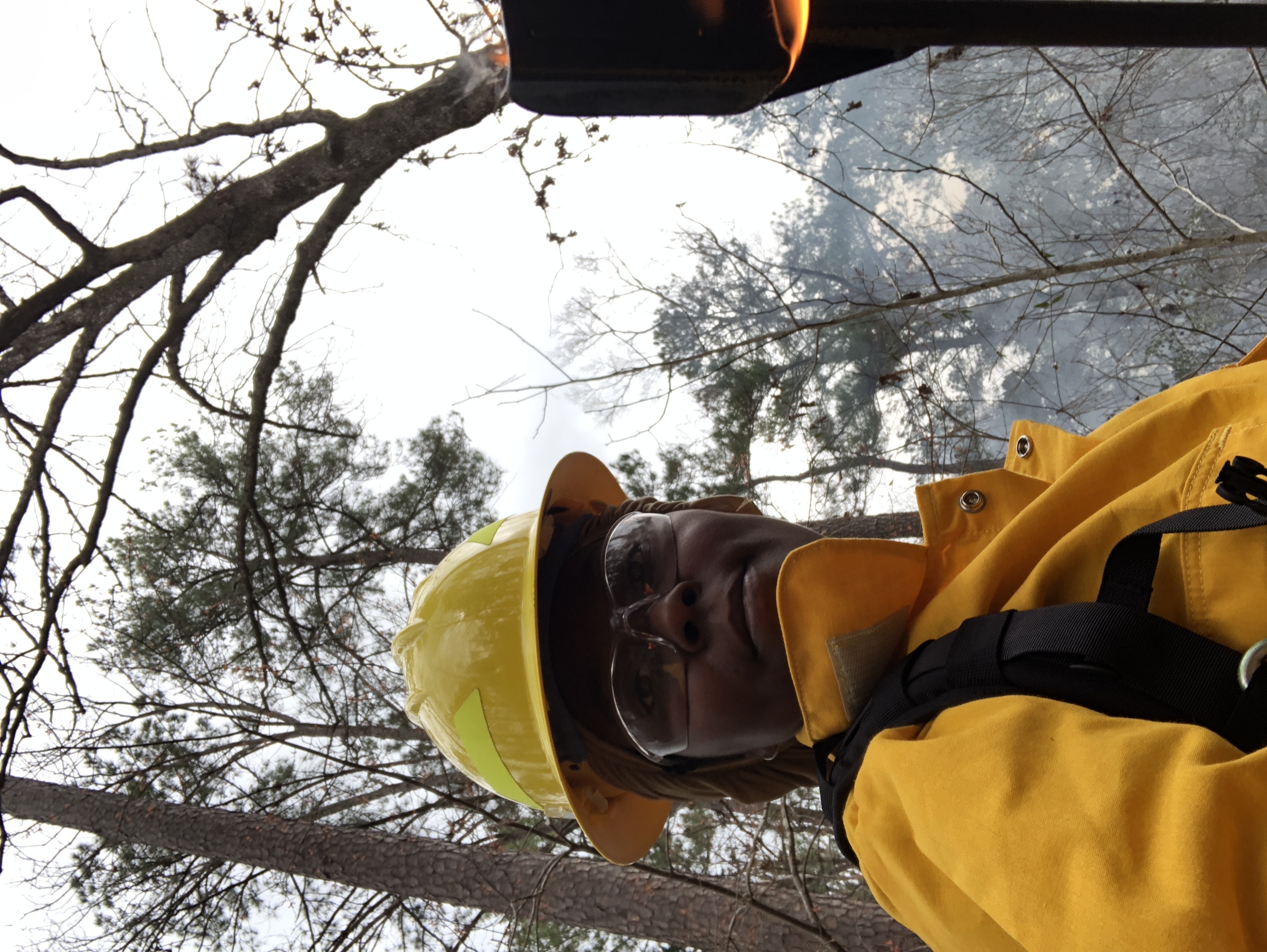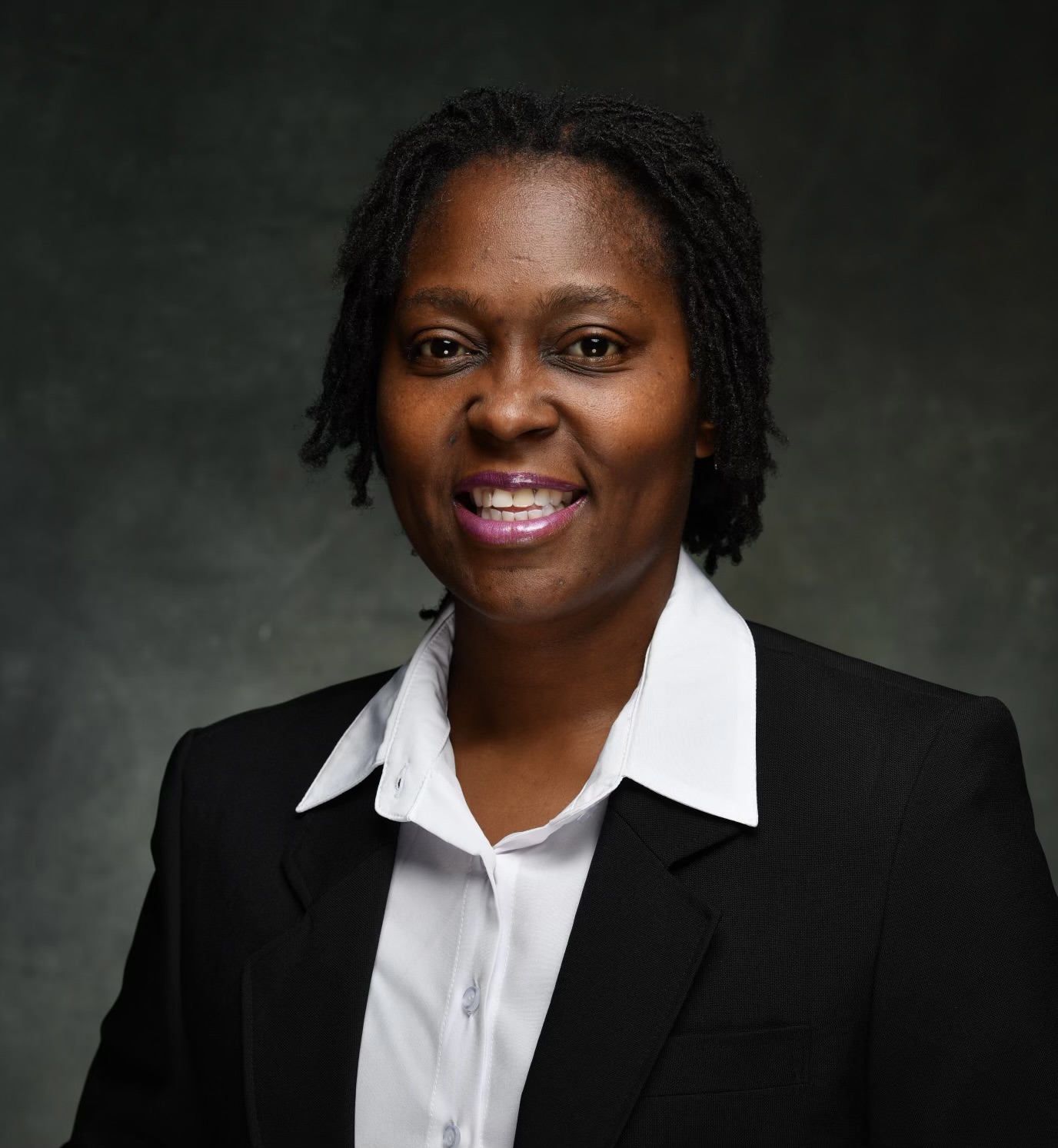From motherhood to fire management: how support and flexibility in academia opened doors for MNR graduate Alicia Arrington-Thomas
August 15, 2023

By Lindsay Kuczera
As a woman with two small children (and later, a third), a spouse deployed in the military, and a learning disability, Alicia L. Arrington-Thomas was unsure how she would fit into a graduate program. Other higher education programs were too fast-paced for her dyslexia and too rigid for her busy life. Virginia Tech’s Master of Natural Resources (MNR) program helped her achieve what she knew she could do if given the right resources and the flexibility that can often be left out of academia.
Flexibility leads to growth
Alicia’s blended background in urban forestry and agriculture spurred her interest to learn how climate change and management of these resources are connected. More than simply learning, she wanted to find her role in the environmental space. “I was interested in my role as a human being in the cohabitation with nature, and in what I can do as an individual and how I can pass this knowledge on to my children,” she said.
Although Alicia was worried that she wouldn’t find a graduate program that could cater to her needs, the MNR staff and instructors assured her of the program’s flexible format. "The courses provided, and the amazing support given by the instructors and staff, allowed me to want more for myself. It also allowed me to think more deeply about management systems, my role in them, and how to function in an ecosystem that's constantly changing,” Alicia said. After taking a few breaks in her studies—including having her third child and enlisting in the military—Alicia was able to complete her degree in 2016 and move forward with new dreams.

The importance of (controlled) fire in nature
Wildfires charged by climate change grow more frequent and intense, and an emphasis on prescribed burning for land management—a practice used by Indigenous peoples for millennia—has gained due consideration in the Western conservation space. Alicia’s interest in fire management began when she was a park ranger at Yellowstone National Parks. It was a pivotal moment in her life that shaped her subsequent education and career choices. After holding various responsibilities in her position as a program manager with the U.S. Forest Service in Rolling Fork, Mississippi, Alicia decided to pursue research into how prescribed fires could play a part in forest management.
Now a third-year PhD student studying ecology at the University of Mississippi, Alicia is researching fire as a management tool, specifically reversing mesophication in the Strawberry Audubon Center in northern Mississippi. Mesophication is when fire is removed from fire-dependent forests, causing them to change from open, sun-loving, fire-tolerant forests to closed, shade-tolerant, fire-sensitive forests. And that is when unnatural wildfires can wreak havoc.
In this Mississippi forest, vines entangle trees and shade-tolerant species take over the forest floor. These species shade out the oak and pine seedlings, creating a dense forest that allows invasive species and vines to thrive while creating a damp forest floor. These shade trees—that Alicia dubbed “parking lot trees” because they provide great shade in urban settings but can become an issue in forests—block out sunlight from reaching the forest floor. Mesophication can also lead to obstruction of natural wildlife corridors.
Using prescribed burning to manage the forest floor creates a host of benefits—it regenerates grasses, opens space for native trees to grow, reduces large wildfires fueled by climate change, and allows turkeys, migratory birds, and other wildlife access to food sources that are now better exposed. Forest health also means economic health in Mississippi, where these oak and pine trees are used for timber products—a top industry for the state. “We must grow with the land; proper management is key for the sustainability and health of all that rely on it,” said Alicia.
The need for continued scientific funding
As a recipient of the 2023 Katherine S. McCarter Graduate Student Policy Award from the Ecological Society of America, Alicia received communications and science policy training and the opportunity to meet with congressional policy makers on Capitol Hill. In April, Alicia and her cohort visited Washington, D.C. to meet directly with Congress members from various states and advocate for adequate funding for the National Science Foundation.
Earlier this year, Congress had to pass a deal to lift the debt ceiling. On the chopping block was funding for science agencies such as the National Science Foundation (NSF) which funds about one-quarter of the federally funded basic academic research in the United States. Biden’s 2024 budget request to Congress, submitted in March, includes a 19% increase, to $11.3 billion, for the National Science Foundation (NSF).
Alicia spoke to members of Congress about the potential cuts and how they would affect university students across the country, since such a large majority of university research is funded by NSF. Alicia used her knowledge and newfound skills to make the connection between having accurate, data-driven science with understanding of how to manage our natural resources and tackle climate change.
So, what’s next?
Well, the sky's the limit. Alicia has an interest in pursuing environmental law, and she thanks Virginia Tech’s MNR staff for giving her the tools she needed to excel and dream bigger. “A lot of people might think that an online degree means that the professors and staff don’t know you or care about you. I definitely disagree because in the MNR program, every professor I had reached out to me during difficult times and offered assistance. I can say I got everything I needed from the program, and it helped me to believe in myself to move forward to where I am today,” she said.

Alicia L. Arrington-Thomas is a first-generation student and is currently a second-year Ph.D. student at the University of Mississippi studying ecology under the guidance of Dr. Steve J. Brewer. She is also a Southeastern Conference Provost Emerging Scholar at the university and a mentor with the Increasing Minority Access to Graduate Education (IMAGE) program under the direction of Ms. Jaqueline Vinson. Her research interests include understanding the reversal of mesophication using prescribed fire to restore ecosystems after a lack of the historical use of fire. She is also interested in how federal laws such as the National Environmental Policy Act, the Clean Air Act, and the Clean Water Act pertain to essential aspects of the environment and communities during restoration. Alicia holds B.S. degrees from Tuskegee University in Plant and Soil Science and Environmental Science. She has an M.S. from Southern University, master’s degrees from Virginia Tech in Natural Resources and in Agricultural and Life Sciences, and a Graduate Certificate in Global Sustainability from Virginia Tech. Alicia aims to put her learning and knowledge to work to assist communities who need to engage with or are unaware of conversations about environmental justice, clean air, and clean water in their communities and ecosystems.


